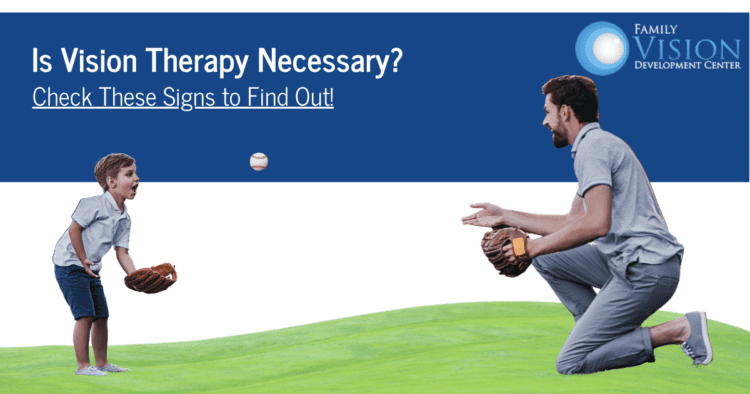

10 Signs That Your Child Might Need Vision Therapy
Vision therapy is a type of eye therapy that helps to improve eye coordination, focusing, and eye movement. It is used to treat a variety of vision problems, including:
- Amblyopia (lazy eye)
- Strabismus (crossed eyes)
- Convergence insufficiency
- Accommodative insufficiency
- Diplopia (double vision)
Why Explore Vision Therapy
Vision therapy can be an extremely effective way to treat a variety of vision disorders that can affect your child’s performance in school, participation in sports and overall confidence and quality of life. The individual sessions are customized to treat your child’s specific visual concerns and can be much more successful than glasses alone.
The team at Family Vision Development Center is highly trained in advanced vision therapy services. Our individualized treatment sessions are performed right in our office and can include a variety of eye exercises, activities or games that kids can easily adapt to.
While vision therapy is a great option for correcting your child’s vision, it is not always easy for a child to recognize what the problem is. Kids are sometimes not even aware that a vision issue is present, or they are not able to express the difficulty they are having. As a parent or caregiver, there are some signs to watch for that can indicate an underlying vision condition that could be treated with vision therapy.
10 Signs of a Possible Vision Condition
- Difficulty keeping their eyes focused. One sign of a focusing issue is when a child cannot maintain clarity when looking from something up close to something far away. They may complain of motion sickness, fatigue or blurry vision. Additionally, kids that sit in the back of the classroom can have difficulty with work being done at the front of the room.
- Difficulty tracking moving objects. You may notice signs of an eye tracking problem when your child is playing catch. If they have difficulty following a moving ball, and frequently miss what seems to be an easy catch, this can be a big indicator of a vision problem.
- Double vision. A child may not be able to communicate that they are seeing two of the same object. However, you can look for the telltale signs, such as squinting, covering one eye or frequently rubbing their eyes.
- Frequent headaches. Headaches can be a sign of a variety of vision problems, including amblyopia, strabismus, and convergence insufficiency. When a child is experiencing blurry vision, double vision, digital eye strain or other vision issues, a common symptom is a headache.
- Reading issues. Many vision problems can impact a child’s ability to read. For instance, you may notice that your child frequently loses their place, skips words, re-reads words or confuses similar words. Additionally, they might have poor overall reading comprehension or a reduced attention span.
- Writing is difficult. Similar to reading problems, vision issues can also make writing difficult for kids. You may notice your child’s writing is messy, they make mistakes, or they have difficulty staying on the line. They may also write words, numbers or letters in reverse. Any of these signs should be a reason to test their vision.
- Issues with paying attention in school. Children with attention issues are often labeled with ADHD without additional testing. However, if your child is easily distracted, has difficulty following directions, or does not complete their work, they could actually be suffering from an undiagnosed vision condition.
- Poor participation in sports. Athletic ability can be very dependent on proper visual skills. For instance, if your child has difficulty catching or throwing a ball, or they have trouble tracking the ball, the reason could be a vision condition.
- Difficulty driving. Young drivers may not be completely confident behind the wheel. However, there are some signs that could indicate a vision issue, rather than a lack of experience. For instance, if they have difficulty staying in their lane, judging distances, or seeing at night, you should have their vision checked.
- Depth perception issues. This can be a difficult problem for a child to explain. But you can watch for signs of a depth perception issue that include difficulty judging distances, bumping into things, frequently tripping or falling, or difficulty catching or throwing a ball.
Vision Therapy at Family Vision Development Center
If you notice any of these signs in your child, it is important to schedule an appointment for a comprehensive vision exam so we can properly diagnose the issue and determine if vision therapy is the best form of treatment. Take the first step by contacting our Aurora office at 630-862-2020 to schedule your appointment today.
Family Vision Development Center is a full-service vision center offering innovative vision therapy services, post-concussive vision rehabilitation, comprehensive vision exams for eyeglasses and contact lenses, management of ocular diseases including glaucoma, diabetes, macular degeneration and cataracts, and a state-of-the-art optical center offering the latest designs in eyewear.

